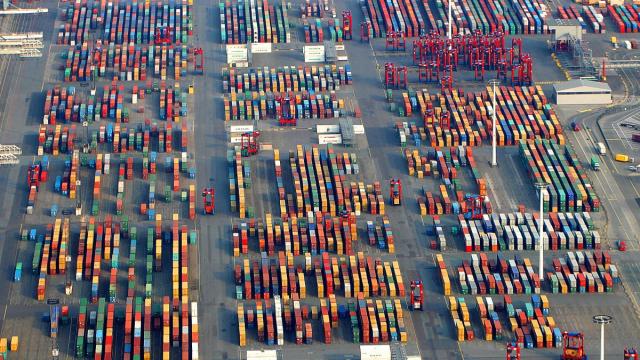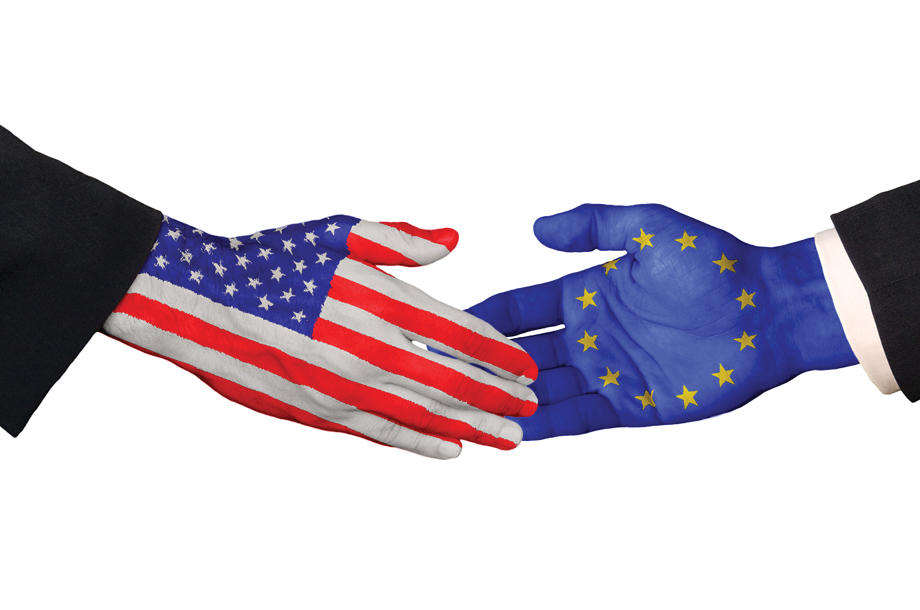
U.S. negotiators of the Transatlantic Trade and Investment Partnership (TTIP) are attempting to block European attempts to tackle climate change, according to leaked documents.
The documents, published by Friends of the Earth in a report called Dirty Deals, claims American representatives are pushing the giant TTIP deal in part because they want the European Union to buy Canadian tar sands oil.
Meanwhile, the report asserts that U.S. officials are trying to water down or altogether stop the European Fuel Quality Directive (FQD) which puts limits on carbon emissions.
“The Fuel Quality Directive sets a clear target of reducing the greenhouse gas intensity of transport fuels by 6% between 2010 and 2020, making it a vitally important and necessary part of the E.U.’s commitment to keep average global temperature increase below 2 degrees,” Friends of the Earth's Samuel Lowe told Occupy.com.
The NGO has joined a broad and growing coalition of organizations opposed to the new free trade agreement. Lowe said weakening the FQD will severely impact the continent’s efforts to tackle man-made climate change. Of particular importance, the fuels transport directive addresses the only growing European sector in terms of greenhouse emissions.
Rejecting Tar Sands to Tackle Climate Change
According to experts, stopping the tar sands project is central to minimizing the risk of climate crisis. Tar sands oil, explained Lowe, is far dirtier and more polluting than conventional oil.
“Emissions from tar sands extraction and processing are 23% higher than the average fuels used in the E.U., as should be reflected when evaluating its greenhouse intensity within the FQD implementation,” he said.
But in the transatlantic trade deal currently being discussed, U.S. representatives want all oil to be "averaged," so that tar sands oil is treated the same as conventional crude oil without any restrictions.
The International Panel on Climate Change stands unequivocally against the extraction and use of tar sands oil, along with other unconventional fossil fuels such as fracked shale gas. The UN body recommends that unconventional fuels of this sort, and a large extent of conventional fuels as well, must stay in the ground in order to prevent a catastrophic 2-degree-Celsius rise – foreseen as causingirreversible planetary crisis.
Swaths of the mainstream media still frequently deny the consensus within the global scientific community about man-made climate change. A Scientific American paper last year analyzed 2,000 peer reviewed papers researched by over 9,000 scientists and found that only one scientist among them disagreed that human behavior was causing climate change. The urgency of the situation is already visible from the impacts on the Arctic to the intensifying weather patterns.
Tar sands oil is not only devastating from a climatic perspective. Recent satellite photos also show tar sands extraction has destroyed vast areas of the world’s boreal forest. In addition, a Yale University study has detailed how the process threatens one of the world’s largest freshwater deltas.
E.U. negotiations for a Fuel Quality Directive have been on the table since 2011. In response, there has been a concerted attack by tar sands oil majors, which have lobbied along with support from the Canadian and U.K. governments.
The Friends of the Earth report claims the U.S. trade negotiators’ motivation to quash the FQD is connected to U.S. oil refineries near the Gulf of Mexico, which are already processing tar sands oil and blending it for export.
If the FQD is enacted, the reduction of sales of tar sands oil in Europe would dramatically cut the expansion of Canadian tar sands and proposed tar sands projects elsewhere. In a similar vein, challenges to the Keystone XL and the other pipelines are causing a bottleneck in the plans of TransCanada and other giant developers.
Chief Tar Sands Cheerleader: Michael Froman
The Friends of the Earth report names U.S. Trade Representative Michael Froman as a central figure attempting to push tar sands oil into Europe. In just one example, Froman last year stated that limiting tar sands sales in Europe would be "discriminatory, environmentally unjustified and could constitute a barrier to U.S.-E.U. trade."
Digging a bit into Froman’s background – and his many turns through the revolving door of business and government – suggests a clear motive for his pushing tar sands sales onto Europe.
After a career in the U.S. Treasury, Froman held senior roles at Citigroup, including the position of Managing Director of Citigroup Infrastructure Investors. Citigroup holds major investments in tar sands. The bank heavily backed the Keystone XL pipeline project, and is largely owned by the China Investment Corporation, which also has extensive investments across the Canadian oil industry and with U.S. refiners.
Pouring more oil on the fire, the New York Times has reported that Citigroup continued to pay Froman even after he finished working for them and had returned to working for the U.S. government.
In public statements, Froman does not allude either to his old or current ties to tar sands interests. Instead, he asserts that the Transatlantic Trade and Investment Partnership embodies the kind of free trade pact that will make both the E.U. and U.S. economies stronger.
Free Trade or Surviving Earth
Free trade may not be, in the end, the choice that rational economists and businessmen themselves choose to take. An independent Stern Review, with co-authorship by the London School of Economics, calculated that if unaddressed today, climate change and the crises it causes could cost the world economy between 5% and 20% of global GDP. UN Secretary-General Ban Ki-moon has called climate change the greatest threat facing humanity.
Meanwhile, the use of renewable energy is soaring globally as costs of renewable technology and production fall dramatically. Portugal recently produced 70% of its energy from renewables over a three-month period, matching similar news from Germany. In Australia, solar electric energy is now cheaper to produce than coal power. The U.K. itself now has half a million homes charging with solar panels.
These stories aren't isolated, but represent the tip of a new energy revolution. Yet even as the TTIP's false promises of free trade threaten to engulf Europe with tar sands oil, further documents leaked by the Sierra Club show measures in the TTIP seek directly to curb the local development of renewables.
The fossil fuel industry has, for many decades, received lavish subsidies from governments. Oil has never been about free trade, but precisely the opposite: it is about rigged markets. U.S. negotiators' ongoing support for the dirtiest fossil fuel – tar sands oil – and their opposition to renewables reaffirms a basic fact: the TTIP negotiations are nothing more than an attempt to further corporate interests at whatever the cost to people and the planet.
3 WAYS TO SHOW YOUR SUPPORT
- Log in to post comments
















